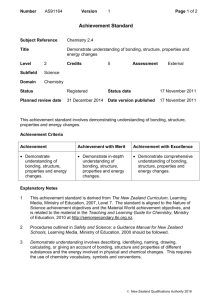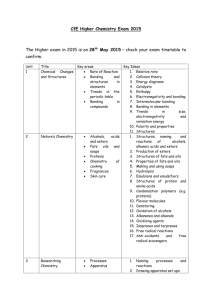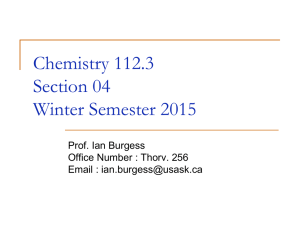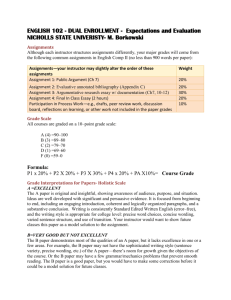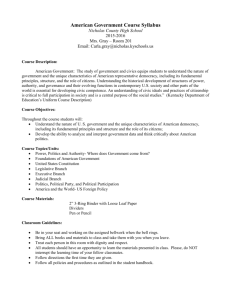M l State 1414 College Way Fergus Falls, MN 56537 877-450
advertisement
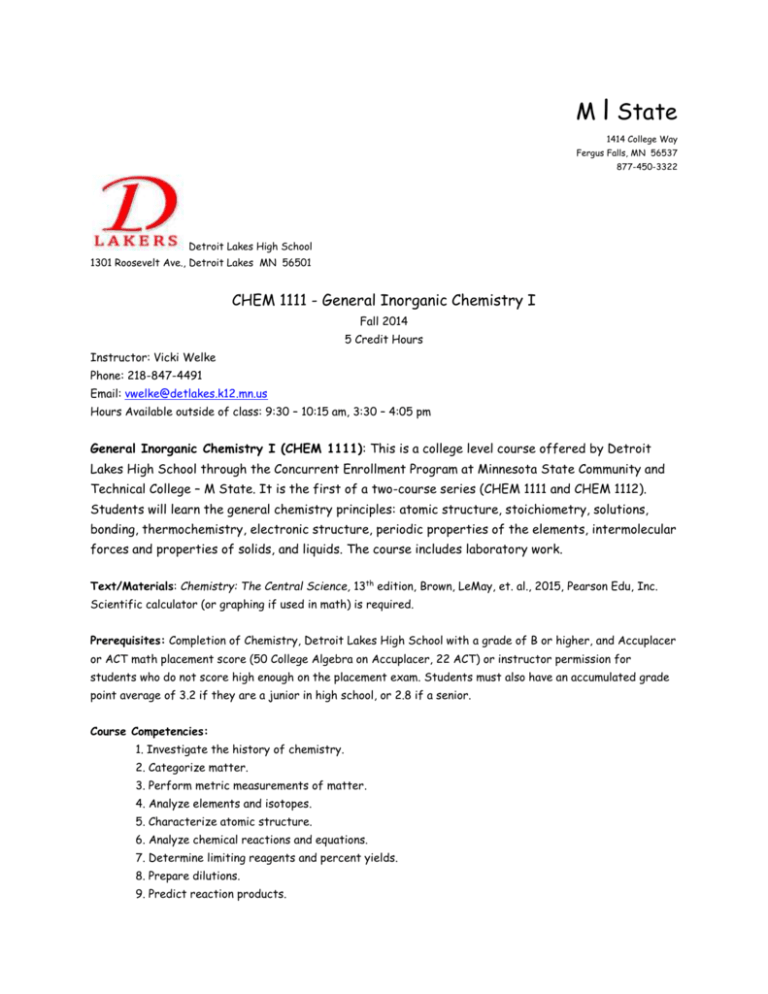
M l State 1414 College Way Fergus Falls, MN 56537 877-450-3322 Detroit Lakes High School 1301 Roosevelt Ave., Detroit Lakes MN 56501 CHEM 1111 - General Inorganic Chemistry I Fall 2014 5 Credit Hours Instructor: Vicki Welke Phone: 218-847-4491 Email: vwelke@detlakes.k12.mn.us Hours Available outside of class: 9:30 – 10:15 am, 3:30 – 4:05 pm General Inorganic Chemistry I (CHEM 1111): This is a college level course offered by Detroit Lakes High School through the Concurrent Enrollment Program at Minnesota State Community and Technical College – M State. It is the first of a two-course series (CHEM 1111 and CHEM 1112). Students will learn the general chemistry principles: atomic structure, stoichiometry, solutions, bonding, thermochemistry, electronic structure, periodic properties of the elements, intermolecular forces and properties of solids, and liquids. The course includes laboratory work. Text/Materials: Chemistry: The Central Science, 13th edition, Brown, LeMay, et. al., 2015, Pearson Edu, Inc. Scientific calculator (or graphing if used in math) is required. Prerequisites: Completion of Chemistry, Detroit Lakes High School with a grade of B or higher, and Accuplacer or ACT math placement score (50 College Algebra on Accuplacer, 22 ACT) or instructor permission for students who do not score high enough on the placement exam. Students must also have an accumulated grade point average of 3.2 if they are a junior in high school, or 2.8 if a senior. Course Competencies: 1. Investigate the history of chemistry. 2. Categorize matter. 3. Perform metric measurements of matter. 4. Analyze elements and isotopes. 5. Characterize atomic structure. 6. Analyze chemical reactions and equations. 7. Determine limiting reagents and percent yields. 8. Prepare dilutions. 9. Predict reaction products. 10. Rank metals by oxidation potentials. 11. Compare electronic structures. 12. Analyze chemical bonding schemes. 13. Determine chemical nomenclature. 14. Compare element properties. 15. Correlate chemical geometry and electronic structures. 16. Summarize the bonding theories. 17. Analyze chemicals for intermolecular forces. 18. Investigate properties of modern materials. 19. Analyze gases, liquids and solids. 20. Use the scientific method to solve problems. 21. Collect experimental data. 22. Analyze data. 23. Communicate results in oral or written form. Course Schedule and Assignments: Schedules of daily lessons, laboratory experiments and assignments will be provided as semester proceeds. Due dates will be included. Ch 1 Introduction: Matter and Measurements Week 1 & 2 of Sept Ch 2 Atoms, Molecules, and Ions Wee 2 & 3 of Sept Ch 3 Chemical Reactions and Reaction Stoichiometry Week 3 & 4 of Sept Ch 4 Reactions in Aqueous Solution Week 1 & 2 of Oct Ch 5 Thermochemistry Week 2 & 3 of Oct Ch 6 Electronic Structure of Atoms Week 3 & 4 of Oct Ch 7 Periodic Properties of the Elements Week 1 & 2 of Nov Ch 8 Basic Concepts of Chemical Bonding Week 2 & 3 of Nov Ch 9 Molecular Geometry and Bonding Theories Week 3 & 4 of Nov Ch 10 Gases Week 1 & 2 of Dec Ch 11 Liquids and Intermolecular Forces Week 2 & 3 of Dec Grading Policies: Grading 90 – 100 % A 80 - 90 % B 70 – 80 % C 60 – 70 % D 0 – 59 % F Assignments Daily work from chapters 5% Laboratory write ups 20 % Exams and Quizzes 75 % There will be 3 exams (each covering 3 chapters) and a final exam (covering 2 chapters as well as accumulative knowledge). There will also be a quiz on each chapter 2 through 11. No retests will be allowed. In the laboratory, students will work individually, in groups to collaborate, and be asked to communicate their results to the class. Each student is required to keep a laboratory notebook for the course. All experiments must be completed in the lab book, with a photocopy of each lab turned into the instructor. Each lab write up will include title, hypothesis, equipment, procedure, observations/data, calculations, discussion, and conclusion. There will be 12 laboratory experiments. Homework assignments will consisting of text book chapter questions as well as teacher developed questions. A running schedule will be posted well ahead of due dates to allow students the opportunity to complete homework and labs around their other activities. Homework assigned is due the day of the exam over those chapters. Homework will not be accepted after exam date for credit. Due dates for laboratory experiments will be posted on the schedule. Labs turned in after the due date will lose 10% of possible points each day late. Accommodations for Students with Disabilities: Detroit Lakes High School is committed to providing equal access to education for all students. Students that have a disability or believe they may have a disability are invited to contact the guidance office as soon as possible to determine eligibility and /or submit accommodation requests. Academic Integrity and Plagiarism: Plagiarism and cheating on exams, assignments, projects, etc., are antithetical to academic integrity and will not be tolerated. Furthermore, not only is plagiarism simply dishonest, it is illegal in the sense that you are stealing another person’s intellectual property. Therefore, plagiarism and other forms of cheating are serious offenses, not only to academia in general, but to your own education as well. Students can fail this course if caught plagiarizing or cheating on course work and/or exams. All material which is derived from other sources (including paraphrased statements, ideas, and direct quotations) must be cited, with in the text of the written work, and/or using an accepted form of footnotes, endnotes, or parenthetical citations as required. Examples of Academic Dishonesty: Cheating – Using or attempting to use unauthorized materials for one’s own academic benefit. Plagiarism – Intentionally or unintentionally presenting as one’s own words the ideas, words, or information of another without citing the reference, using American Psychological Association (APA) guidelines. Reusing an assignment – Using an assignment previously submitted to another instructor without prior approval from both instructors. Fabrication/falsification – Inventing or knowingly altering information or laboratory data. Facilitating academic misconduct – Assisting another in committing actions considered academically dishonest. Laboratory Agreement: All students will be provided with safety training. Each students will receive a laboratory safety agreement which both student and parent/guardian must read and sign agreement to, before the student will be allowed to participate in laboratory experiments.


